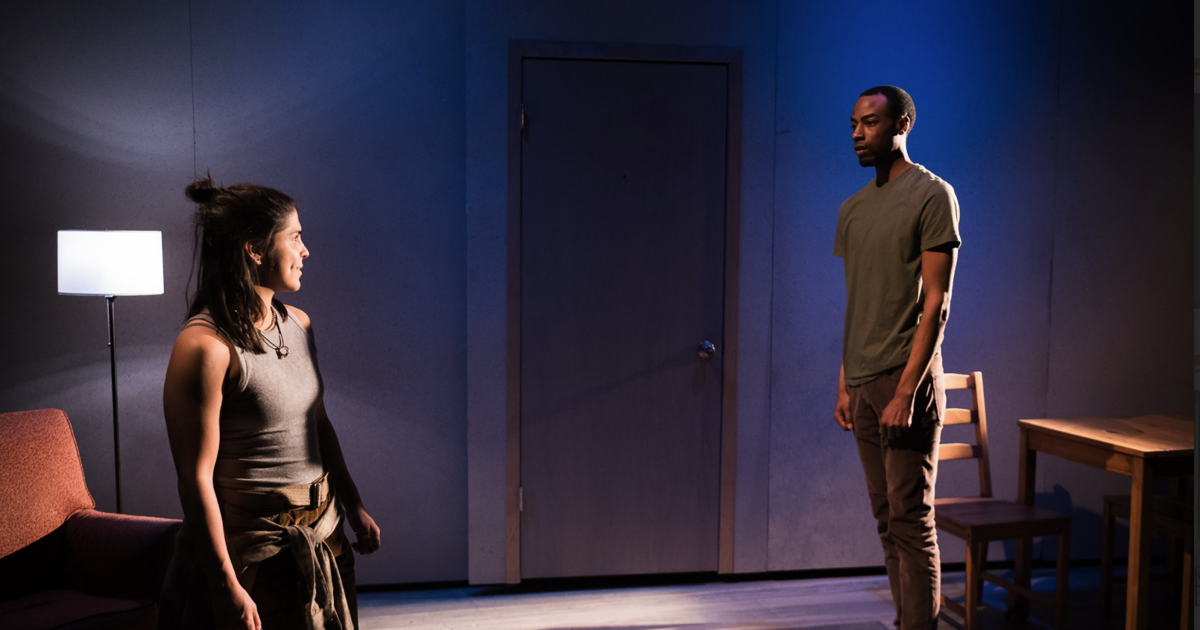
John Kolvenbach’s “Love Song” is an 80-minute (or so) ode to the power of imagination. A quirky rom-com that could be a sit-com, it’s one of those plays that’s fun while you’re watching it but may seem insubstantial afterwards. The main virtues are fairly engaging characters, an interesting set-up with an offbeat twist, some observations about different kinds of love and lots of smart, witty dialogue, much of it fast-paced.
The challenge is what tone to take when staging the work in a world that has changed a lot since the premiere in 2006 at Steppenwolf Theatre, which was directed by Austin Pendleton and featured longtime ensemble members Francis Guinan, Molly Regan, Ian Barford and the late Mariann Mayberry. Specifically, our attitudes towards mental illness nowadays are more complicated, and the issue is arguably more pressing.
Remy Bumppo’s production, directed by newish artistic director Marti Lyons, treats the piece as an absurdist comedy with poignant underpinnings. Everything is exaggerated. Nothing is quite real.
We sense this from the moment we see Beane (Terry Bell), the focal character. Detached from what’s going on around him and from the world in general, he answers questions before they’re asked or not at all and displays behavior that easily could get him institutionalized. He lives in a sparsely furnished flat — just an armchair, floor lamp, small table and two wood chairs (scenic design by Joe Schermoly) — and spends much of his time in the dark, where the lights flicker and the walls close in around him. (They move sideways in this case.) Bell makes his alienation palpable.
Beane’s sister Joan (Sarah Coakley Price) is worried about him. A successful executive, she lives in a spacious apartment with chic mid-century modern furnishings and full-length windows overlooking the city streetscape. Her husband Harry (Ryan Hallahan) also is a successful executive, and much of their repartee consists of him disagreeing with what she says and calling it “conversation.” One extended bit involves Joan ranting about an intern she fired for “incompetence,” and Harry retorting that she ruined someone’s life over simple mistakes. Harry’s concern over Beane consists of trying to give him a standardized test — that backfires amusingly.
Then one night, Beane comes home to find an intruder, who turns out to be Molly (Isa Arciniegas), lounging in his chair, wearing his clothes, stealing his meager possessions (a mug, a spoon, a toothbrush, half a tube of toothpaste) and then his wallet. She’s very aggressive, but he’s more intrigued than intimidated. He can’t find out who she is, but the next time he comes home, he hopes she’s there again.
In short, Beane falls in love, and his world changes. He goes from taciturn to talkative. All his senses are heightened, so that a simple turkey sandwich tastes wonderful, and he rhapsodizes about it. He starts to enjoy wine, conversation and life in all its messiness.
Beane’s enthusiasm rubs off on Joan and Harry, who decide to take a break from their uptight, regimented existence. They play hooky from work, calling in sick, and pretend-smoke cigarettes while lounging around flirtatiously.
They also want to meet Molly and pay a surprise visit to Beane. That’s where the twist comes in, but I don’t want to reveal the surprise (though I found it telegraphed a bit). Suffice it to say that the sweet outcome probably would not be possible in a play written today and raises questions about its viability. This is all the more reason that Lyons’ approach works, especially with the help of the strong acting and admirable staging (in such a small space).
